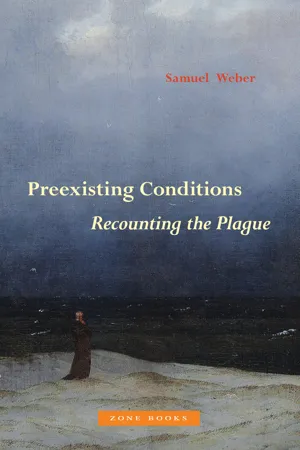
- English
- ePUB (mobile friendly)
- Available on iOS & Android
About This Book
A stunning philosophical and literary account of canonical plague tales Many are the losses suffered and lives lost during the recent COVID-19 pandemic. Since 2020, writers around the globe have penned essays and books that make sense of this medical and public health catastrophe. But few have addressed a pressing question that precedes and is the foundation of their writings: How does the very act of narrating the pandemic offer strategies to confront and contend with the pandemic's present dangers? What narratives have been offered during past plague and pandemic times to ease suffering and loss and protect individuals and communities from a life lived under the most precarious of conditions? The philosopher and literary and cultural critic Samuel Weber returns to past narratives of plagues and pandemics to reproduce the myriad ways individual and collective, historical and actual, intentional and unintentional forces converge to reveal how cultures and societies deal with their vulnerability and mortality. The "preexisting conditions"—a phrase taken from the American healthcare industry—of these very cultures converge and collide with the urgent situations of individuals confronting the plague. Texts drawn from the Bible, Sophocles, Thucydides, Boccaccio, Luther, Defoe, Kleist, Hölderlin, Artaud, and Camus demonstrate how in the process of narration individuals come to reconsider their relationship to others, to themselves, and to the collectives to which they belong and on which they depend.
Frequently asked questions
Information
Table of contents
- Cover Page
- Title Page
- Copyright Page
- Epigraph
- Contents
- Preface: The End of the World as We Knew It
- I. The Local and the General
- II. Monotheological Antecedents: Life against the Living (Genesis, Exodus)
- III. Polytheistic Antecedents: The Plague as Stasis (Thucydides)
- IV. Storytelling as Friction (Boccaccio, The Decameron)
- V. The Lutheran Response: The Neighbor (Luther, “Should a Christian Flee the Plague?”)
- VI. “Out of all Measures” (Defoe, A Journal of the Plague Year)
- VII. Tragedy as Trauerspiel (Kleist, The Tragedy of Robert Guiscard, Duke of the Normans)
- VIII. Preexisting Conditions (Artaud, “The Theater and the Plague”)
- IX. Confinement (Camus, The Plague)
- X. Living with Plagues (Hölderlin, “Remarks on Sophocles’s Oedipus”)
- Notes
- Index